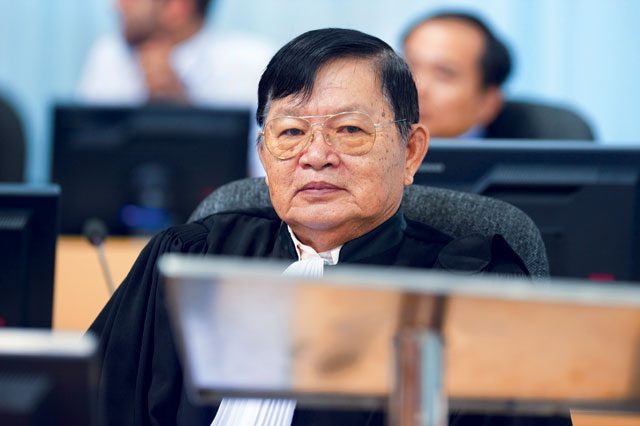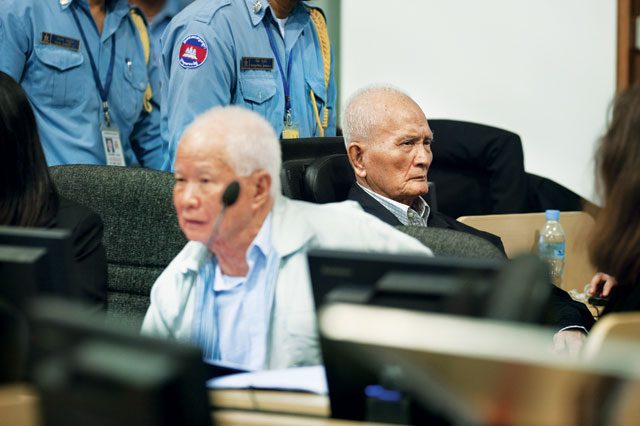
Through the looking glass: Son Arun is currently defending Nuon Chea at the Khmer Rouge tribunal
“We’ll start with my story,” Son Arun says. The 70-year-old, who is currently defending Nuon Chea at the Khmer Rouge tribunal, tells his tale chronologically and with few prompts, revealing a personal trajectory that has mirrored his country’s arcs, falls and confusions.
That story begins in Cambodia’s Kampong Cham province in 1973, where Arun was a major commanding a battalion of more than 500 men in a losing war against the country’s communists. On August 11, Arun and his soldiers found themselves pinned down by the Khmer Rouge.
“We fought for six days and six nights without food or water,” Arun says. “Can you believe that? Six days without water and you can die – but I’m still alive.”
Arun had been receiving US air support, but on August 15 at 11am sharp, all bombing ceased. This was the last day of direct US involvement in Indochina. The Cambodian Air Force’s propeller-driven planes failed to make a difference in the fight, and on August 16, with most of his men lying dead around him, Arun managed to escape the battlefield with his bodyguard.
By 1975, Arun had been redeployed to the seaside resort town of Sihanoukville. His new unit, comprised of green recruits, capitulated to the Khmer Rouge on April 18 – the day after Phnom Penh fell to Pol Pot. Fearing that the Khmer Rouge would kill officers like him, Arun found a fisherman willing to take him to one of the islands off the coast. There, he convinced a group of Republican marines to sail with him to Thailand. As soon as they arrived, they dropped their weapons into the sea.
“I left my wife and three daughters in Cambodia,” Arun says. “I never thought I’d see them again.”
With the Cambodian currency in his pocket rendered worthless by the new regime, Arun was forced to tramp around Thailand, working odd jobs until he was able to visit the American embassy in Bangkok. His military credentials got him on an immediate flight to the US.
He describes integration camps in California, managing a doughnut shop, marrying one of his Cambodian co-workers, moving to Houston to pursue a baccalaureate in business administration, having a daughter, then travelling to Thailand in 1981 to join Cambodia’s burgeoning anti-Vietnamese resistance. There, he established and oversaw a guerrilla warfare school in the jungles bordering Cambodia until a bout of malaria forced him to return to the US.
Upon arrival, he discovered that his new wife had left him.
“Her family told her that I was dead,” Arun says, “and when I did get back, they wouldn’t let me see her.”
Although he has contacted her in recent years, Arun hasn’t seen his daughter since she was 13 months old.
Heartbroken and penniless, Arun went back to working odd jobs before landing a position with the Cambodian resistance’s mission to the United Nations. In late 1981, he got word that his first family was still alive. Arun was able to sponsor them, and by 1984 they were reunited in the US.
“My wife thought I was dead too,” Arun says. “We felt reborn again when we saw each other.”
The reunion and the birth of another daughter did nothing to quell Arun’s restlessness. After serving as chairman of the Cambodian Republican Federation (he still keeps his tattered business card in his wallet), he travelled to Jakarta in 1989 to observe a meeting between Cambodia’s three opposition factions and the Vietnamese-backed government of Hun Sen. The Vietnamese were about to withdraw from the country, and negotiations were underway to end a prolonged civil war. Those negotiations resolved nothing, but a chance encounter with Hun Sen’s wife, Bun Rany, in a restaurant led to an official invitation to visit Cambodia – Arun’s first trip to his homeland in 14 years.
“We were scared,” Arun says. He describes seeing a country in ruins. “Everywhere we went, an agent from the Ministry of Foreign Affairs followed us.”
Arun visited regularly between 1989 and 1993, the year of the UN-sponsored elections, when he made a permanent move to Cambodia to work with the victorious royalist party in the country’s National Assembly. He completed his legal training in 1996 and has been involved in the profession ever since.
“As soon as I heard about the negotiations to create a Khmer Rouge tribunal, I got it in my mind that I had to defend at least one top Khmer Rouge leader,” Arun says. Arun’s family, who still lives in the US, was opposed to the idea.
“I didn’t listen to them,” Arun says. “This job is bigger than them, and it’s bigger than the brother and sister I lost to the Khmer Rouge… I want to know the truth. I want to know why so many people died in the 1970s, and I want to know who killed them.”

Arun initially approached Khmer Rouge head of state Khieu Samphan, who had been one of his secondary school teachers in the 1960s. Through Khieu Samphan, Arun got to know several Khmer Rouge functionaries. One of them happened to be the nephew of Nuon Chea, Pol Pot’s right-hand man and the former deputy secretary of the Communist Party of Kampuchea. Like Khieu Samphan, Nuon Chea had signed a ceasefire with the Cambodian government in the late 1990s. Until he was arrested in 2007, he was living free in Cambodia’s Pailin province – a Khmer Rouge stronghold that is still more or less run by members of the long-toppled regime. Ee Chhien, Pailin’s current governor, was Pol Pot’s messenger and bodyguard.
“The day they arrested Nuon Chea, his nephew called to ask if I’d be his uncle’s lawyer,” Arun says. Arun immediately contacted Khieu Samphan, who urged him to take on the case.
According to the international members of Nuon Chea’s defence team, Arun has grown quite close to his client, even waiting at his bedside when Nuon Chea fell gravely ill this time last year. Arun, who acts as a liaison between Nuon Chea and the international lawyers, is said to be one of the few people the 87-year-old communist trusts.
“Nuon Chea and Khieu Samphan still do not accept that the Khmer Rouge killed people,” Arun says. According to Arun, his client blames the deaths on wayward regional commanders and personal grievances between villagers, as well as Vietnamese agents provocateur who sought to undermine Cambodia’s noble revolution. Still, Arun says that Nuon Chea has no illusions about his fate.
“As soon as he was placed in detention, he said that he’d be in prison for the rest of his life.”
In the face of accusations that Nuon Chea was one of the Khmer Rouge’s chief masterminds, the defence team has opted to advocate Nuon Chea’s stance, characterising the man as a remote cadre educator who taught his underlings to “love” and “respect” the people. The team maintains that Nuon Chea had little to no knowledge of the bloody chaos that erupted around him. They have also repeatedly attacked the tribunal as being an unfair victor’s court, routinely citing its failure to summon as witnesses Khmer Rouge deserters who now serve vital roles in the Cambodian government.
Although the team’s international lawyers regularly mouth such politically charged rhetoric, it has made Arun few friends in the current government. Coupled with the intense hatred some Cambodian people have for his client – and, by extension, his client’s lawyers – Arun, who can remember a time when extrajudicial killings were commonplace in Cambodia, says he never ventures out at night.
“I’m waiting for the tribunal to be over so I can retire,” Arun says. “I’m getting tired… and I don’t believe in it anymore.”
A growing weariness is apparent in his eyes, perhaps the product of one too many lost battles. Still, always the wanderer, he refuses to let himself be pinned down, saying that he’s unsure if he’ll make a permanent return to his family in California. “Maybe I’ll go back and forth,” he says evasively. “Right now, I cannot say.”
An uncertain future for the ECCC
The United Nations and the Cambodian government established the Extraordinary Chambers in the Courts of Cambodia (ECCC) in 2006. Its mandate is to try those most responsible for atrocities committed during the Khmer Rouge’s 1975 to 1979 rule, when an estimated 1.7 million people lost their lives.
The ECCC has only delivered one conviction since 2010. In June 2011, proceedings began against the four highest-ranking surviving members of the regime. One defendant has been declared unfit to stand trial since then, and another has died, leaving only Nuon Chea and Khieu Samphan in the dock. A verdict in the first segment of their case, which concluded on October 31st, is expected in the first half of 2014.
Proceedings have already taken four years longer than initially expected, and two planned cases involving a handful of mid-ranking cadres have been vociferously opposed by the Cambodian government. Moreover, the court – which will have spent a total of $208.7 million by the end of this year – is facing funding shortfalls, with departments being trimmed and Cambodian staff having gone months without pay this and last year.
Right now, the ECCC is holding meetings to discuss what other charges will be levied against the two remaining defendants. In a document released on the ECCC’s website late last month, the Supreme Court Chamber says that it would like a final trial that includes charges pertaining to “S-21, a worksite, a cooperative, and genocide” to “commence as soon as possible.”
If a second panel of judges is hired, this trial could begin as soon as late February 2014. Without citing details, the ECCC also says that it will be able to secure funding until at least the end of 2015. This will likely be the last case the ECCC ever hears.
